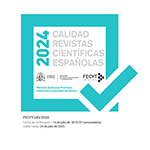The good professional
Abstract
This paper starts from a formal definition of moral judgment to determine the ethical character of professionalism, which is understood as the fulfillment of an institutional commitment with some core values which guide the professional performance. Such set of values let us to draw a line between the good professional and the dishonest (or corrupt) professional. We define a notion of professional integrity correlating with personal identity. This allows arguing for a new way of understanding the relationship between personal morality and professional ethics, which implies a new way of thinking about professional identity. These suggestions are illustrated by the discussion of Soyer’s case for a client’s «right to failDownloads
Article download
License
In order to support the global exchange of knowledge, the journal Cuadernos de Trabajo Social is allowing unrestricted access to its content as from its publication in this electronic edition, and as such it is an open-access journal. The originals published in this journal are the property of the Complutense University of Madrid and any reproduction thereof in full or in part must cite the source. All content is distributed under a Creative Commons Attribution 4.0 use and distribution licence (CC BY 4.0). This circumstance must be expressly stated in these terms where necessary. You can view the summary and the complete legal text of the licence.









